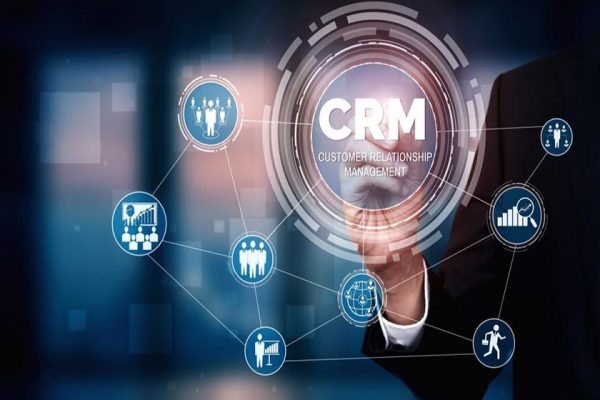In the fast-paced world of e-commerce, building strong customer relationships is key to thriving in a competitive market. That’s where Customer Relationship Management (CRM) systems come in.
By integrating a CRM system into your e-commerce business, you can unlock a treasure trove of benefits that will propel your success to new heights. From enhanced customer understanding to targeted marketing campaigns, let’s explore how CRM integration can revolutionize your online business and key benefits of integrating a CRM system in e-commerce
What is a CRM in E-commerce?
CRM in e-commerce refers to the integration of a Customer Relationship Management (CRM) system within an e-commerce business. A CRM system is a software tool that helps businesses manage and analyze customer interactions, data, and relationships throughout the customer lifecycle.
In the context of e-commerce, CRM systems are specifically designed to support and optimize customer relationships and interactions within an online retail environment. They provide e-commerce businesses with a centralized platform to capture, store, and analyze customer data from various touchpoints, such as website visits, purchases, email communications, social media interactions, and customer support inquiries.
CRM systems in e-commerce typically offer features and functionalities tailored to the unique needs of online businesses. These features can include:
- Customer data management: CRM systems store and organize customer data, including contact information, purchase history, preferences, and behavioral data. This centralized database allows businesses to have a comprehensive view of each customer, enabling personalized interactions and targeted marketing efforts.
- Order and inventory management: It can integrate with e-commerce platforms to manage orders and inventory. This allows businesses to track and process orders, manage stock levels, and provide accurate shipping and delivery information to customers.
- Customer service and support: It enables businesses to handle customer inquiries and issues efficiently. They provide tools to manage customer support tickets, track communication history, and ensure timely responses. Integration with other support channels, such as live chat or email, allows for seamless customer service across multiple touchpoints.
- Marketing automation: It supports targeted marketing campaigns by leveraging customer data. They provide tools to segment customers, create personalized marketing messages, and automate marketing workflows. This helps businesses deliver relevant content, promotions, and recommendations to customers, driving engagement and conversion.
- Analytics and reporting: It offers reporting and analytics capabilities to track key metrics and measure business performance. Businesses can generate reports on sales trends, customer behavior, marketing campaign effectiveness, and other KPIs. These insights help in making data-driven decisions and optimizing marketing and sales strategies.
Benefits of Integrating a CRM System in E-commerce
Integrating a Customer Relationship Management (CRM) system in e-commerce can bring several benefits to businesses. Here are some of the key advantages:
1. Enhanced Customer Understanding
CRM systems allow businesses to collect and analyze customer data, including purchase history, preferences, and interactions. This information provides valuable insights into customer behavior and enables businesses to understand their customers better. With this knowledge, businesses can personalize marketing efforts, offer targeted promotions, and improve overall customer experience.
2. Improved Customer Service
It helps businesses streamline their customer service processes. Customer inquiries and issues can be tracked, managed, and resolved more efficiently through the system.
Integration with other channels like email, live chat, and social media allows for a unified view of customer interactions, ensuring consistent and timely responses. By providing excellent customer service, businesses can foster loyalty and build long-term relationships with their customers.
3. Effective Sales Management
It provides tools to manage and track sales activities. Sales teams can use the system to track leads, manage pipelines, and monitor customer interactions throughout the sales cycle. This enables better sales forecasting, helps identify opportunities, and ensures timely follow-ups. Additionally, CRM systems can automate sales tasks, freeing up time for sales representatives to focus on building relationships and closing deals.
4. Targeted Marketing Campaigns
By leveraging the customer data stored in the CRM system, businesses can create highly targeted marketing campaigns. They can segment customers based on their preferences, purchase history, or demographics and tailor marketing messages accordingly.
Personalized marketing campaigns have higher chances of resonating with customers, leading to increased engagement, conversion rates, and ultimately, sales.
5. Improved Cross-selling and Upselling
With a CRM system, businesses can identify cross-selling and upselling opportunities more effectively. By analyzing customer data and purchase patterns, businesses can recommend relevant products or services to customers based on their preferences and previous purchases. This targeted approach can increase average order value and drive additional revenue.
6. Enhanced Data Management and Reporting
CRM systems provide centralized data storage and easy access to customer information. This streamlines data management, eliminates data silos, and ensures data consistency across the organization.
Furthermore, CRM offers reporting and analytics capabilities, allowing businesses to track key performance indicators (KPIs), monitor sales trends, measure marketing campaign effectiveness, and make data-driven decisions.
7. Scalability and Growth
It can support business growth and scalability. As the customer base expands, the CRM system can handle increased data volume and provide a scalable platform for managing customer relationships. It can also integrate with other business systems and tools, such as e-commerce platforms, marketing automation software, and customer support systems, creating a seamless flow of information across various departments.
Overall, integrating a CRM system in e-commerce can lead to improved customer relationships, increased sales efficiency, targeted marketing efforts, and better overall business performance.
What Makes HubSpot an Ideal E-commerce CRM?
HubSpot is considered an ideal e-commerce CRM for several reasons. Here are some key factors that make HubSpot a popular choice for e-commerce businesses:
- All-in-one platform: HubSpot offers a comprehensive suite of tools and features in a single platform. It combines CRM, marketing automation, sales, and customer service functionalities, allowing e-commerce businesses to manage their entire customer lifecycle in one place. This integration eliminates the need for multiple software solutions and promotes seamless data flow and collaboration across different teams.
- Robust CRM capabilities: HubSpot CRM provides e-commerce businesses with a powerful set of features to manage customer relationships effectively. It offers contact management, deal tracking, and pipeline management tools, allowing businesses to track and nurture leads, manage sales processes, and analyze customer interactions. The CRM also integrates with e-commerce platforms, enabling businesses to synchronize customer and order data between their online store and HubSpot.
- Marketing automation and personalization: HubSpot’s marketing automation features empower e-commerce businesses to create targeted and personalized marketing campaigns. Businesses can segment their customer base, design email workflows, automate lead nurturing, and deliver personalized content based on customer behavior and preferences. This level of automation and personalization helps businesses engage customers, drive conversions, and enhance the overall shopping experience.
- E-commerce-specific features: It offers specific features tailored to the needs of e-commerce businesses. It supports e-commerce tracking, allowing businesses to capture and analyze valuable data, such as abandoned carts, purchase history, and revenue attribution. It also provides e-commerce reporting dashboards that offer insights into sales performance, customer acquisition, and customer lifetime value. These features enable businesses to make data-driven decisions and optimize their e-commerce strategies.
- Integration capabilities: It integrates with various third-party e-commerce platforms, including Shopify, WooCommerce, and Magento. This allows businesses to synchronize customer and order data seamlessly between their e-commerce platform and HubSpot CRM. The integration ensures that customer data remains consistent across systems and enables businesses to leverage HubSpot’s CRM and marketing automation features alongside their existing e-commerce infrastructure.
- Scalability and flexibility: It is suitable for businesses of all sizes, from startups to large enterprises. It offers scalable plans that can accommodate the growth and changing needs of e-commerce businesses. HubSpot’s modular structure allows businesses to start with the CRM and add other HubSpot tools as needed, providing flexibility and scalability as the business expands
- Extensive ecosystem and resources: It has a thriving community and offers a wealth of educational resources, including training courses, certifications, and a knowledge base. E-commerce businesses can leverage these resources to learn best practices, enhance their skills, and maximize the value they derive from the HubSpot platform.
Summary
In the dynamic world of e-commerce, every business strives to stand out and succeed. By integrating a Customer Relationship Management (CRM) system into your online business, you can unlock a range of game-changing benefits.
From gaining deep insights into your customers to offering exceptional customer service, and from driving targeted marketing campaigns to scaling your operations efficiently, CRM integration empowers your e-commerce business to reach new heights.
So, don’t wait any longer—harness the power of CRM and skyrocket your e-commerce success today! And, we hope you’re wholly acknowledged with the key benefits of integrating a CRM system in e-commerce.







Exactly what I was looking for, thankyou for putting up.
Oh my goodness! a tremendous article dude. Thanks Nonetheless I am experiencing situation with ur rss . Don’t know why Unable to subscribe to it. Is there anybody getting identical rss drawback? Anybody who knows kindly respond. Thnkx
medication from mexico pharmacy: cmqpharma.com – mexican border pharmacies shipping to usa
mexican rx online
https://cmqpharma.online/# mexican pharmaceuticals online
mexican online pharmacies prescription drugs
Hi! This is my first visit to your blog! We are a group of volunteers and starting a new initiative in a community in the same niche. Your blog provided us valuable information to work on. You have done a wonderful job!
http://foruspharma.com/# mexico drug stores pharmacies
mexican border pharmacies shipping to usa: mexico pharmacy – mexican mail order pharmacies
https://foruspharma.com/# buying prescription drugs in mexico online
mexican drugstore online [url=https://foruspharma.com/#]mexican border pharmacies shipping to usa[/url] medication from mexico pharmacy
canadian pharmacy checker [url=http://canadapharmast.com/#]best online canadian pharmacy[/url] onlinecanadianpharmacy
canadian family pharmacy: legitimate canadian pharmacies – canadian drug stores
http://foruspharma.com/# buying prescription drugs in mexico
purple pharmacy mexico price list [url=https://foruspharma.com/#]purple pharmacy mexico price list[/url] best online pharmacies in mexico
safe canadian pharmacies: best canadian pharmacy – my canadian pharmacy reviews
vipps approved canadian online pharmacy: the canadian drugstore – canadian drugs online
https://canadapharmast.com/# best canadian online pharmacy
mexican drugstore online: mexican online pharmacies prescription drugs – п»їbest mexican online pharmacies
canadian pharmacy meds [url=https://canadapharmast.online/#]medication canadian pharmacy[/url] prescription drugs canada buy online
reputable indian online pharmacy: Online medicine home delivery – cheapest online pharmacy india
http://indiapharmast.com/# india pharmacy
indianpharmacy com [url=https://indiapharmast.com/#]п»їlegitimate online pharmacies india[/url] indian pharmacies safe
canadian pharmacy com: canadian pharmacy scam – canada drug pharmacy
indian pharmacy paypal: india pharmacy – mail order pharmacy india
http://indiapharmast.com/# indian pharmacy
canadian drugs online [url=https://canadapharmast.online/#]legitimate canadian pharmacy online[/url] canada pharmacy world
canadian family pharmacy: pharmacy in canada – best canadian pharmacy
https://doxycyclinedelivery.pro/# doxycycline online singapore
get clomid without rx [url=http://clomiddelivery.pro/#]where can i buy clomid[/url] can i get generic clomid without dr prescription
http://amoxildelivery.pro/# amoxicillin 500 mg tablet
doxycycline order online canada [url=http://doxycyclinedelivery.pro/#]cost of doxycycline australia[/url] buy doxycycline online nz
doxycycline 75 mg: buy doxycycline india – doxycycline 150mg pill
paxlovid india: buy paxlovid online – paxlovid cost without insurance
http://amoxildelivery.pro/# where to buy amoxicillin
http://ciprodelivery.pro/# cipro for sale
buy amoxil: amoxicillin order online no prescription – cost of amoxicillin 30 capsules
http://paxloviddelivery.pro/# Paxlovid buy online
buy ciprofloxacin [url=http://ciprodelivery.pro/#]cipro ciprofloxacin[/url] ciprofloxacin 500mg buy online
https://clomiddelivery.pro/# where buy generic clomid without a prescription
buy paxlovid online [url=https://paxloviddelivery.pro/#]paxlovid price[/url] paxlovid india
http://clomiddelivery.pro/# can i order generic clomid online
where buy cheap clomid now: can i get clomid no prescription – order generic clomid pills
https://clomiddelivery.pro/# cost of cheap clomid no prescription
ciprofloxacin over the counter: buy cipro online canada – buy cipro without rx
buy paxlovid online: п»їpaxlovid – paxlovid cost without insurance
http://paxloviddelivery.pro/# paxlovid covid
paxlovid generic [url=http://paxloviddelivery.pro/#]paxlovid buy[/url] paxlovid pill
http://ciprodelivery.pro/# cipro 500mg best prices
amoxacillian without a percription [url=http://amoxildelivery.pro/#]how much is amoxicillin prescription[/url] amoxicillin over counter
clomid price: can i purchase cheap clomid without a prescription – where to get generic clomid without dr prescription
https://amoxildelivery.pro/# amoxicillin buy no prescription
can i get generic clomid without rx: how can i get cheap clomid without dr prescription – where buy cheap clomid
https://clomiddelivery.pro/# how to get generic clomid for sale
ciprofloxacin over the counter [url=https://ciprodelivery.pro/#]antibiotics cipro[/url] purchase cipro
how to buy cheap clomid now: where buy clomid without dr prescription – how to buy clomid without prescription
paxlovid for sale: paxlovid covid – paxlovid buy
https://paxloviddelivery.pro/# paxlovid pill
500 mg doxycycline pill: doxycycline australia – doxycycline 100mg without prescription
http://ciprodelivery.pro/# purchase cipro
ciprofloxacin 500 mg tablet price [url=https://ciprodelivery.pro/#]cipro for sale[/url] buy cipro online without prescription
http://amoxildelivery.pro/# amoxicillin 500 mg cost
cost of cheap clomid no prescription [url=https://clomiddelivery.pro/#]cost of generic clomid without insurance[/url] where can i get clomid pill
buy amoxicillin 500mg usa: amoxicillin 500mg capsules uk – amoxicillin 500mg price
buy paxlovid online: paxlovid price – Paxlovid over the counter
https://clomiddelivery.pro/# how to get generic clomid
http://amoxildelivery.pro/# amoxicillin where to get
paxlovid for sale [url=http://paxloviddelivery.pro/#]paxlovid pharmacy[/url] Paxlovid over the counter
where can you buy doxycycline online: doxycycline 10mg price – can you buy doxycycline
https://amoxildelivery.pro/# amoxicillin 825 mg
can i buy cheap clomid price: where can i get generic clomid without insurance – buy cheap clomid